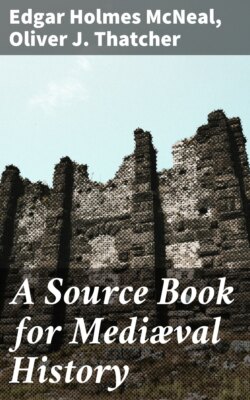Читать книгу A Source Book for Mediæval History - Oliver J. Thatcher - Страница 54
На сайте Литреса книга снята с продажи.
35. The Petrine Theory as Stated by Leo I, 440–61.
ОглавлениеTable of Contents
Migne, 64.
Leo I (440–61) made frequent use of the Petrine theory. In brief this theory is that to Peter as the prince of the apostles was committed the supreme power over the church. To him the keys were intrusted in a special manner. In this consisted his primacy, his superiority over the other apostles. This primacy or first rank he communicated to his successors, the bishops of Rome, who, by virtue of being his successors, held the same primacy over the church and over all other bishops as Peter held over the other apostles. The passage on which this theory is based is found in Matt. 16:18 f: "And I say unto thee, That thou art Peter, and upon this rock I will build my church; and the gates of hell shall not prevail against it. And I will give unto thee the keys of the kingdom of heaven: and whatsoever thou shalt bind on earth shall be bound in heaven: and whatsoever thou shalt loose on earth shall be loosed in heaven."
We offer the following detached passages from the works of Leo I to illustrate his conception of the theory.
Col. 628. Our Lord Jesus Christ, the Saviour of the world, caused his truth to be promulgated through the apostles. And while this duty was placed on all the apostles, the Lord made St. Peter the head of them all, that from him as from their head his gifts should flow out into all the body. So that if anyone separates himself from St. Peter he should know that he has no share in the divine blessing.
Col. 656. If any dissensions in regard to church matters and the clergy should arise among you, we wish you to settle them and report to us all the terms of the settlement, so that we may confirm all your just and reasonable decisions.
Col. 995. Constantinople has its own glory and by the mercy of God has become the seat of the empire. But secular matters are based on one thing, ecclesiastical matters on another. For nothing will stand which is not built on the rock [Peter] which the Lord laid in the foundation [Matt. 16:18]. … Your city is royal, but you cannot make it apostolic [as Rome is, because its church was founded by St. Peter].
Col. 1031. You will learn with what reverence the bishop of Rome treats the rules and canons of the church if you read my letters by which I resisted the ambition of the patriarch of Constantinople, and you will see also that I am the guardian of the catholic faith and of the decrees of the church fathers.
Col. 991. On this account the holy and most blessed pope, Leo, the head of the universal church, with the consent of the holy synod, endowed with the dignity of St. Peter, who is the foundation of the church, the rock of the faith, and the door-keeper of heaven, through us, his vicars, deprived him of his rank as bishop, etc. [From a letter of his legates.]
Col. 615. And because we have the care of all the churches, and the Lord, who made Peter the prince of the apostles, holds us responsible for it, etc.
Col. 881. Believing that it is reasonable and just that as the holy Roman church, through St. Peter, the prince of the apostles, is the head of all the churches of the whole world, etc.
Col. 147. This festival should be so celebrated that in my humble person he [Peter] should be seen and honored who has the care over all the shepherds and the sheep committed to him, and whose dignity is not lacking in me, his heir, although I am unworthy.
